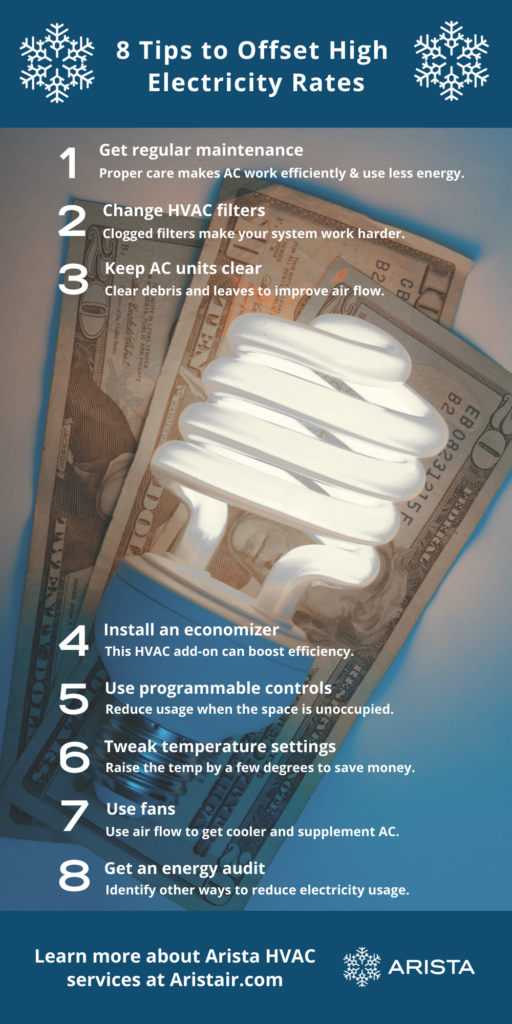
It probably won’t surprise you that electricity rates in NYC are already about 60 percent higher than the national average, yet ConEd wants to raise the rates by at least 11%.
What can you do to protect your budget from the impact of higher electricity rates? Reduce your electricity usage. Here are some tips to help you do that.
Cost-cutting tips to offset high electricity rates in NYC
You can’t change the electricity rates in NYC, but you can use less electricity. Air conditioning is the biggest consumer of electricity in most spaces. So we’ll start with tips to improve the efficiency of your AC system. Then we’ll go reveal a few tips for preventing the loss of conditioned air and reducing the cooling load in your home or business.

1. Service your air conditioning equipment
The easiest and most important step you can take to optimize your system efficiency is to have it serviced regularly.
HVAC maintenance typically includes cleaning the components, changing filters, detailed inspections, and replacing worn parts that cause the system to work harder to cool the space (and also make breakdowns more likely to happen). Maintenance keeps everything working at peak performance so it uses less electricity.
How often do you need HVAC maintenance? That depends on your usage and space, but at least twice per year (ideally in spring for AC and fall for heating).
TIP: Want to know more about how that works and how neglected maintenance costs you? Here’s a guide that explains more: Calculating the Hidden Cost of Poor HVAC Maintenance.
2. Change HVAC filters regularly
Depending on your system and your environment, your HVAC filters may need to be changed in between maintenance visits. That’s because clogged filters put a strain on the system and force it to work harder, which uses more electricity.
Ask your service provider to order extra filters for you, and show you how to change them yourself. In most cases, it’s quick and easy.
3. Keep your AC units clear
Poor air flow around the unit is another thing that causes your AC to use extra power. So make sure your evaporator (indoor) and condenser (outdoor) units are not surrounded by boxes or covered in leaves.
4. Install an economizer
Depending on your system, you may be able to get an economizer, and add-on component that can make the system more efficient. It works by mixing outdoor air with return air when the temperature and humidity conditions are right.
5. Use programmable controls to set a schedule
If you haven’t yet made the move to a programmable thermostat (or automated commercial control system), it’s time to take this important step. You’ll no longer need to remember to adjust thermostats when the space is unoccupied.
When electricity prices are high, this step alone can save you a bundle by reducing usage of the HVAC system all year long.
TIP: You can use smart lighting to program lights on a schedule, too.
6. Tweak your temperature settings
Turning the thermostat up a few degrees in summer may not even be noticeable, yet can make a significant difference in energy usage.
Consider setting your thermostat to 78 degrees for at least 8 hours of the day. According to ConEd, turning it down to 75 degrees costs 18% more, and 72 degrees costs 39 percent more!
7. Use fans to supplement AC
Did you know that the cooling effect of moving air can make people more comfortable than a lower temperature setting? And fans use much less electricity than your air conditioner. So make a habit of using ceiling fans and other fans to supplement your AC (which can also help you keep the thermostat higher, too).
8. Get an energy audit
An energy audit can uncover lots of ways to save energy in your home or business. A professional will walk through the space to evaluate insulation, weatherization, lighting, appliances, and more. They will also review your energy expenses. An audit typically costs a few hundred dollars, but the information you gain can help you save far more on your utility bills.
9. Add insulation & seal leaks
If you have an older space, you may not need an audit to know that your space needs attention. Adding insulation, sealing cracks, and replacing or sealing windows and doors can make a big difference in your HVAC energy usage.
TIP: The right window coverings can help, too. Close them on hot summer days to keep out the heat of the sun, and open them on cold winter days to bring in some extra heat. That helps reduce the load on your HVAC system so it uses less energy.
10. Get ENERGY STAR appliances
Older appliances, especially the ones you use daily (dishwashers, refrigerators, washer/dryers), can really drive up your energy bills. Consider replacing them with modern, ENERGY STAR-rated appliances to save electricity.
Efficient AC protects you from high electricity rates in NYC
Taking the steps outlined here can definitely reduce your energy usage by 11% or more. That should balance out the electricity rate hike and prevent busting your budget!
Need help with optimizing your AC efficiency? Arista can help with maintenance service, design issues, and system updates and replacements. Give us a call today.

